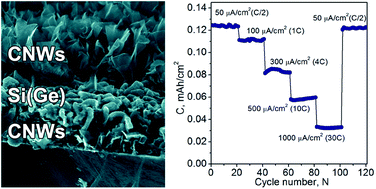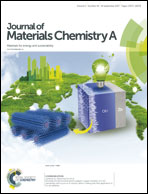Gaining cycling stability of Si- and Ge-based negative Li-ion high areal capacity electrodes by using carbon nanowall scaffolds†
Abstract
We report an approach to stabilize the electrochemical performance of silicon- and germanium-based thin film anodes by using carbon nanowall matrices. Silicon and germanium layers were deposited onto vertically oriented carbon nanowall scaffolds and this procedure has been repeated multiple times producing multilayered structures with increased silicon and germanium areal mass loading. It was demonstrated that the areal specific capacity of multilayered anodes achieves up to 2 mA h cm−2 without sacrificing cycling stability. Based on post-mortem SEM analysis of the electrodes we speculate that the reason for the improved cycling stability of multilayered highly loaded silicon/graphene composites is the ability to relax the mechanical stresses in the films.



 Please wait while we load your content...
Please wait while we load your content...